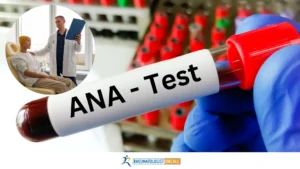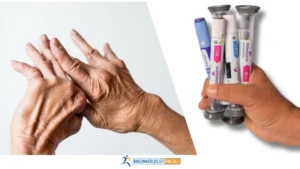SHARE
Muscle pain can be a sign of an autoimmune disease or can be induced by infections and medication. This article will discuss how muscle pain, or myalgia, can be a sign or symptom of an autoimmune disease.
What is muscle pain?
Muscle pain, myalgia, is described as an ache, a dull feeling of pain in the muscles. It may involve different groups of muscles like the upper part of the arms or thighs or the upper and lower groups of muscles in the arms and legs. Muscle pain can also lead to weakness. Patients can describe difficulties combing their hair, still in a pot, or getting out of the chair.
What other symptoms can occur with muscle pain?
Muscle pain can be associated with other symptoms that can suggest an autoimmune disease like
- Rashes of the face, “malar rash” (butterfly rash) in lupus
- Rashes on the chest or hands (Gotron’s papules) in dermatomyositis
- Skin changes in scleroderma
- Stiffness in the shoulders in polymyalgia rheumatica
- Headaches (in Takayasu’s arteritis)
What autoimmune diseases cause muscle pain?
Muscle pain can be a sign of muscle inflammation, like myositis, inflammation around the muscle area, sign of muscle injury, rhabdomyolysis, or a side effect from medication (e.g. statins or cholesterol-lowering medication)
Polymyalgia rheumatica
Patients over the age of 60 can develop muscle pain and weakness associated with severe muscle stiffness, mostly in the mornings. They will have difficulties raising their arms, combing their hair, or raising from a chair. The markers of inflammation can increase as a result of excessive inflammation.

Inflammatory myopathies (dermatomyositis, polymyositis)
Muscle pain can be the result of inflammation in the muscles, named myositis. Inflammation can affect only the muscles (polymyositis) or both, the skin and the muscles (dermatomyositis). There might be other causes like inclusion body myositis or necrotizing autoimmune myositis. Inflammatory myopathies can affect other organs, causing inflammation in the lungs (interstitial lung disease) and skin (rashes like Gotron papules, heliotrope rash around the eyes, calcifications in the skin) and affecting the nails. Inflammation can cause muscle destruction and permanently damage the muscles if not treated appropriately.
Takayasu’s arteritis
Takayasu’s arteritis is a type of disease that can cause inflammation of the arteries. This disease is usually seen in young adults before the age of 45. The inflammation will lead to the narrowing of the arteries and decrease blood supply to the muscles. This will lead to muscle pain, especially when using the muscles when more blood supply is needed. Patients will develop pain in the arms when they do a repetitive motion like stirring in a pot.
Statin-induced myopathies
Statins are a class of medication used to lower blood cholesterol levels. Most patients tolerate these medications well, but some may develop muscle pain, muscle aches, myositis (muscle inflammation), or rhabdomyolysis (muscle destruction). If you develop muscle pain while taking a statin medication (e.g, simvastatin, atorvastatin, Lipitor, pravastatin) you should contact your doctor and be evaluated further.
Rhabdomyolysis
Rhabdomyolysis is a severe condition that results in muscle destruction and can be fatal if not treated immediately and appropriately. There are many causes of rhabdomyolysis, like prolonged immobilization (after a fall), crashes (motor vehicle accidents), electrical shock, infections, and snake bite (venom).
What tests should you get for muscle pain?
There are many tests that your doctor will order if you report muscle pain. Here are the most common tests that I will order for patients that will come for muscle pain evaluation
- Comprehensive metabolic panel to evaluate for electrolytes abnormalities (low calcium level)
- Thyroid hormones (TSH, Free T4)
- Magnesium level
- Muscle enzymes: Creatine kinase, aldolase
- Markers of inflammation (ESR / erythrocyte sedimentation rate, C-Reactive protein / CRP)
An electromyography test can be ordered if your doctor suspects a muscle or neurologic disease.
If an inflammatory disease of the muscle is suspected, then an MRI (magnetic resonance imaging) of the muscles will be appropriate to evaluate if there is inflammation in the muscle.
For patients where inflammation in the muscle is seen, a muscle biopsy will be done to confirm the diagnosis
How to manage muscle pain in autoimmune diseases?
Muscle pain related to autoimmune diseases needs a careful evaluation from a specialist rheumatologist. Rheumatologists are specially trained physicians skilled in evaluating, diagnosing, and treating autoimmune diseases. You should get access immediately, as many diseases can cause severe and permanent damage. The treatment of muscle autoimmune disease (e.g polymyositis) requires a good understanding of the disease and very close monitoring. If you need help evaluating muscle pain, you are welcome to reach out to our practice, Rheumatologist OnCall.
This is an educational article that aims to broaden your knowledge, but it does not offer you medical advice. If you have an autoimmune disease, like rheumatoid, and need help, you are welcome to check out our practice and get the help you need when you need it the most. Rheumatologist OnCall is a telemedicine rheumatology practice that broadens access to a specialist in a very short time when you need it the most and breaks geographical barriers. Check out the states where we are licensed to see patients in the US and reach out to us if needed. We are happy to serve you.














